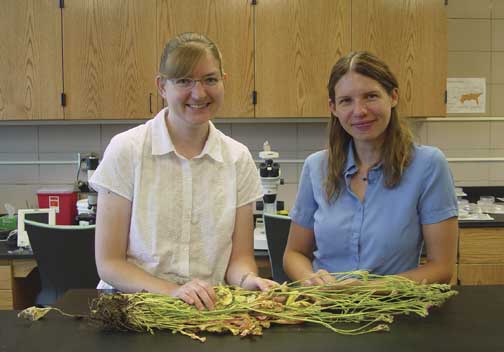One-stop shop: Newly integrated Plant and Insect Diagnostic Clinic
|
Do you have problems with soybeans turning yellow or insects in your alfalfa? Pernicious weeds that you don't recognize? Don't know what to do or who to ask for help? Iowa State University Extension's new Plant and Insect Diagnostic Clinic staff can assist in answering your questions. The Plant and Insect Diagnostic Clinic can diagnose plant health problems caused by diseases, insects, herbicides, or the environment. The clinic also can identify insects, weeds, and fungi. Once they have diagnosed your disease or identified your insect pest, they can advise you on the best course of action to take. "We believe that a one-stop shop will make it much easier for farmers, crop advisers, and all our clientele to contact us and get the timely help they need, whether they have an insect, disease, or weed problem," says Laura Jesse, clinic diagnostician. There is no charge for insect, weed, and fungal identification. There is a $10 charge for diagnosis of plant problems (plant diseases or insect feeding damage). The clinic will host an open house on Wednesday, July 25, from 2 to 4 p.m. Meet the diagnosticians and other staff, see the clinic facility, and enjoy light refreshments. Plant samples should consist of the entire plant, when possible, or at least a representative sample. Wrap the plant material in a dry paper towel or newspaper. Place loosely in a plastic bag and ship in a sturdy box. Insects should be shipped in a container that will prevent crushing in the mail, a pill bottle or vial of some sort. Soft-bodied insects, like caterpillars, ship better if preserved in alcohol. Hand sanitizer works as well.  Wrap plants in a paper towel and place in a plastic bag for shipping. (Christine Engelbrecht) Wrap plants in a paper towel and place in a plastic bag for shipping. (Christine Engelbrecht)
 Ship soft-bodied insects in a pill bottle or vial and preserve in alcohol or hand sanitizer. (Christine Engelbrecht) Ship soft-bodied insects in a pill bottle or vial and preserve in alcohol or hand sanitizer. (Christine Engelbrecht)
Include a sample submission form. Photos of the overall field also are helpful for diagnosis. Send photos by mail or a digital image by e-mail to the clinic, and if a sample is needed, staff can let you know. Contact the clinic by phone at (515) 294-0581, e-mail sickplant@iastate.edu or insects@iastate.edu, or send a sample to Plant and Insect Diagnostic Clinic, 327 Bessey Hall, Ames, IA 50011.  Christine Engelbrecht (left) and Laura Jesse (right). (Rashelle Matthiesen-Anderson) Christine Engelbrecht (left) and Laura Jesse (right). (Rashelle Matthiesen-Anderson)
Christine Engelbrecht is an extension program specialist and plant diagnostician at the Plant and Insect Diagnostic Clinic. Laura Jesse is an extension program specialist and insect diagnostician at the Plant and Insect Diagnostic Clinic. This article originally appeared on page 227 of the IC-498(19) -- July 16, 2007 issue. Updated 07/19/2007 - 1:40pm
|


